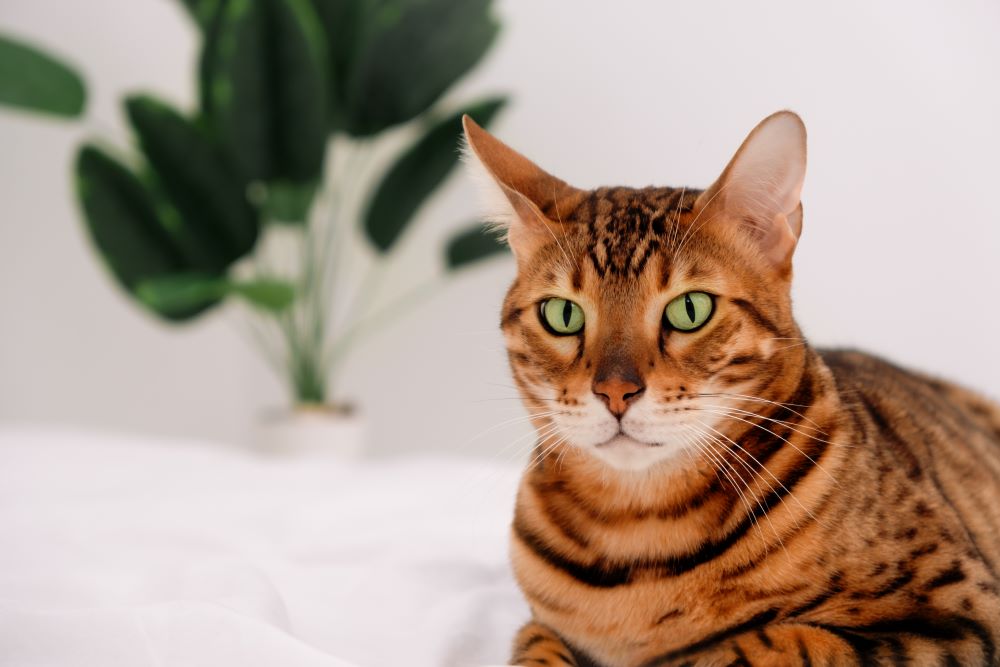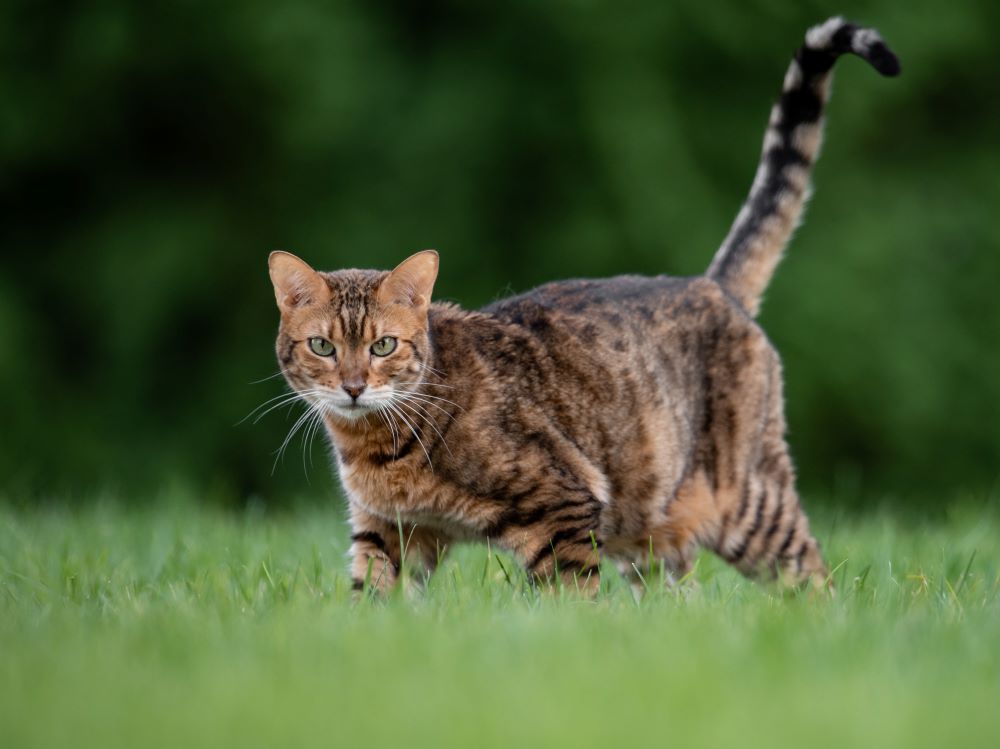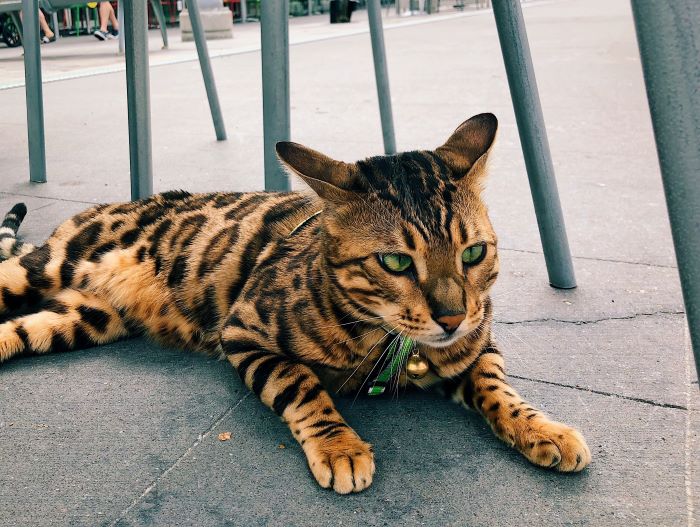Get Pet Insurance for your Cat & Dog

Zero
Documentation
Quick
Claim Process
Affordable
Premium
Terms and conditions apply*
- {{species}}
- {{indoorOutdoor}}
- {{suminsured}}
Bengal Cat Breed Characteristics & Information

Bengal cats are a blend of domestic and Asian leopard cats known for their distinctive spotted or marbled coat patterns. Their intelligence is remarkable, often displaying problem-solving skills that surpass typical feline behaviour.
In this comprehensive guide, we’ll explore everything from their unique characteristics to health concerns and effective training methods.
What Defines Bengal Cats?
Bengal cats are a striking breed renowned for their exotic appearance and lively personalities. They are naturally protective of their owners because of their wild background, which also gives them their unique looks and personality.
They're generally safe pets, but their high energy levels might not suit every home. However, for new cat owners, Bengal cats can be great because they're easy to adapt and love to play and interact.
What are the Characteristics of Bengal Cats?

Understanding the characteristics of Bengal cats is crucial for making an informed decision about whether they are the right fit for your lifestyle:
- Lifespan: Bengal cats typically live between 12 to 15 years, provided they receive proper care and nutrition.
- Height: Bengal cats are medium-sized cats, with males reaching heights of 10 to 18 inches and females averaging 8 to 10 inches.
- Weight: Bengal cats weigh between 3 to 7 kg, with males generally heavier than females.
- Coat: Bengal cats have short or long, silky coats that require minimal grooming. Their coats can be patterned with rosettes, spots, or marbling.
- Colour: Bengal cats come in a variety of colours, including brown, seal, silver, charcoal, and snow.
- Behaviour and Personality: Bengal cats are playful, energetic, and active. They are usually good with kids and can coexist with other pets, given proper training.
- Living Conditions: They thrive in homes with ample space to roam and explore. Providing vertical space and interactive toys enriches their environment.
- Temperament: Bengal cats exhibit fearlessness, curiosity, and a high energy level, making them engaging companions.
- Breed Group: They belong to the hybrid breed group and possess a wild appearance due to their ancestry.
What are the Health Problems in Bengal Cats?

While Bengal cats are generally healthy, they may face certain health issues. Here are five common health problems:
- Feline Leukaemia Virus (FeLV): It is a contagious virus that can cause cancer and other serious illnesses in cats. Vaccination is recommended to protect Bengal cats.
- Entropion: Entropion is a condition that causes the eyelids to roll inward, irritating and damaging the cornea. Surgery is often necessary to correct this condition.
- Feline Infectious Peritonitis (FIP): FIP is a viral disease that attacks the abdominal activity of Bengal Cats. Supportive care can help manage the symptoms.
- Patellar Luxation: Patellar luxation occurs in Bengal cats when their kneecap slips out of its proper position. Surgery is sometimes required to correct this condition.
- Hip Dysplasia: Hip dysplasia is a malformation of the hip joint in this breed that can cause lameness. Surgery may be necessary to manage the symptoms.
How to Take Care of Bengal Cats?
Bengal cats are not considered high-maintenance pets, but they do require some specific care to stay healthy. Here are some tips:
- Diet and Nutrition: Bengal cats are high-energy cats and need a high-quality diet that includes turkey, raw meat and chicken. Choose a food that is specifically formulated for Bengal cats or other active breeds.
- Feeding: Bengal cats should be fed two to three meals per day. Kittens may need to eat more frequently. 70% of the food should consist of raw meat, and the food should be at room temperature.
- Grooming: Bengal cats have short, fine coats that require minimal grooming. However, it is still important to brush your cat regularly to remove loose hair and prevent mats.
- Exercise: Bengal cats are very active and need plenty of exercise to prevent boredom and destructive behaviours. Provide your cat with plenty of toys, climbing activities and playtime, and consider investing in a cat tree or scratching post.
- Engage Them with Water: Bengal cats are known for their love of water. You can also try adding a water fountain to your cat's routine. They love to splash water, by giving them even playtime in water, you can keep them happy.
- Dental Care: Dental care is just as important for cats as it is for humans. Brush your cat's teeth regularly or provide dental chews to help keep their teeth clean and prevent plaque buildup.
Bengal cats stand as an intriguing fusion of wild aesthetics and domestic charm. Their striking appearance and intelligent demeanour make them a captivating choice for cat lovers. With proper care, attention, and a nurturing environment, Bengal cats can thrive, bringing joy, energy, and companionship to their owners' lives for years to come.












